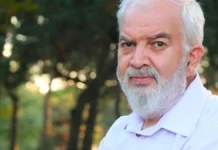The health of a critically ill man who was detained in a hospital while waiting for his doctor and later arrested has deteriorated considerably in prison, according to his wife, the Bold Medya news website reported.
Yunus Tosun, 31, underwent an operation to remove a brain tumor in March 2022. He was arrested on May 6 to serve a seven-year, six month sentence for links to the Gülen movement. Tosun was detained in a hospital waiting room while preparing for an MRI scan.
Tosun’s wife, Özlem Tosun, said her husband had started experiencing mental health problems after the surgery. She added that he was in no condition to be imprisoned and needed frequent follow-up examinations.
“After the surgery, my husband had problems expressing himself,” she said. “We asked for his sentence to be postponed, but there is still no answer from the authorities. In the meantime, my husband will first have to undergo a medical examination to determine if he is fit to remain in prison.”
Özlem Tosun said her husband’s mental health had deteriorated in prison, and he repeatedly told them he would die in his cell. “He has started having headaches again, and we fear the tumor has returned,” she said. “He visited the hospital last week, but they only prescribed pain killers and discharged him.”
Tosun was first arrested in November 2016 and sent to Ankara’s Sincan Prison. A year later, he was released pending trial. However, his sentence was recently upheld by the Supreme Court of Appeals.
Tosun was accused of using the ByLock smartphone application. Turkey considers ByLock, once widely available online, a secret tool of communication among supporters of the faith-based Gülen movement since a coup attempt on July 15, 2016, despite the lack of any evidence that ByLock messages were related to the abortive putsch, leading to the arrest of thousands who were using it.
President Recep Tayyip Erdoğan has been targeting followers of the Gülen movement, inspired by Turkish Muslim cleric Fethullah Gülen, since the corruption investigations of Dec. 17-25, 2013, which implicated then-prime minister Erdoğan, his family members and his inner circle.
Dismissing the investigations as a Gülenist coup and conspiracy against his government, Erdoğan designated the movement as a terrorist organization and began to target its members. He intensified the crackdown on the movement following the abortive putsch.
Turkish authorities have denied political prisoners, even those with critical illnesses, release from prison so they can at least seek proper treatment. Human rights activists and opposition politicians have frequently criticized authorities for not releasing critically ill prisoners.
Peoples’ Democratic Party (HDP) deputy Ömer Faruk Gergerlioğlu said sick prisoners were not released until they were at the point of no return. He claimed that prisoners did not have access to proper healthcare facilities such as hospitals and clinics.















